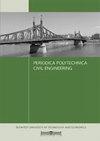Overview of the Empirical Relations between Different Aggregate Degradation Values and Rock Strength Parameters
IF 1.4
4区 工程技术
Q3 ENGINEERING, CIVIL
引用次数: 0
Abstract
The aggregates are essential materials in civil engineering, they are used for railway and road constructions, for hydraulic engineering but they are also the base material of concrete. The crushed stones are exposed to several effects during their lifespan. Therefore, several tests were developed to evaluate their performance. One of the most important aspects is the resistance to degradation. However, degradation tests require special types of equipment and usually take longer than common strength tests which are more likely to be available for rock materials. Therefore, the empirical connections between strength and degradation values can be extremely useful in practice. The paper aimed to collect all available relationships and datasets from the literature that presents the relations between these different parameters – such as Aggregate Impact Value (AIV), Aggregate Crushing Value (ACV), Ten Percent Fines Value (TFV), Los Angeles Abrasion Value (LAAV), and micro-Deval Coefficient (MDE) – and rock strength parameters – such as Uniaxial Compressive Strength (UCS) and Point Load Strength Index (IS(50)) – and to provide the best-fit formula for different rock types. The paper also highlights the difficulties and limitations of the compared relationships.不同骨料降解值与岩石强度参数的经验关系综述
骨料是土木工程中必不可少的材料,它们用于铁路和公路建设,用于水利工程,但它们也是混凝土的基础材料。碎石在其使用寿命中会受到几种影响。因此,开发了几个测试来评估它们的性能。最重要的一个方面是抗降解性。但是,退化试验需要特殊类型的设备,并且通常比通常用于岩石材料的普通强度试验需要更长的时间。因此,强度和退化值之间的经验联系在实践中是非常有用的。本文旨在从文献中收集所有可用的关系和数据集,这些关系和数据集表示这些不同参数之间的关系-如骨料冲击值(AIV),骨料破碎值(ACV), 10%细粒值(TFV),洛杉矶磨损值(LAAV),和岩石强度参数-如单轴抗压强度(UCS)和点荷载强度指数(IS(50)) -并提供最适合不同岩石类型的公式。本文还强调了比较关系的困难和局限性。
本文章由计算机程序翻译,如有差异,请以英文原文为准。
求助全文
约1分钟内获得全文
求助全文
来源期刊

Periodica Polytechnica-Civil Engineering
工程技术-工程:土木
CiteScore
3.40
自引率
16.70%
发文量
89
审稿时长
12 months
期刊介绍:
Periodica Polytechnica Civil Engineering is a peer reviewed scientific journal published by the Faculty of Civil Engineering of the Budapest University of Technology and Economics. It was founded in 1957. Publication frequency: quarterly.
Periodica Polytechnica Civil Engineering publishes both research and application oriented papers, in the area of civil engineering.
The main scope of the journal is to publish original research articles in the wide field of civil engineering, including geodesy and surveying, construction materials and engineering geology, photogrammetry and geoinformatics, geotechnics, structural engineering, architectural engineering, structural mechanics, highway and railway engineering, hydraulic and water resources engineering, sanitary and environmental engineering, engineering optimisation and history of civil engineering. The journal is abstracted by several international databases, see the main page.
 求助内容:
求助内容: 应助结果提醒方式:
应助结果提醒方式:


